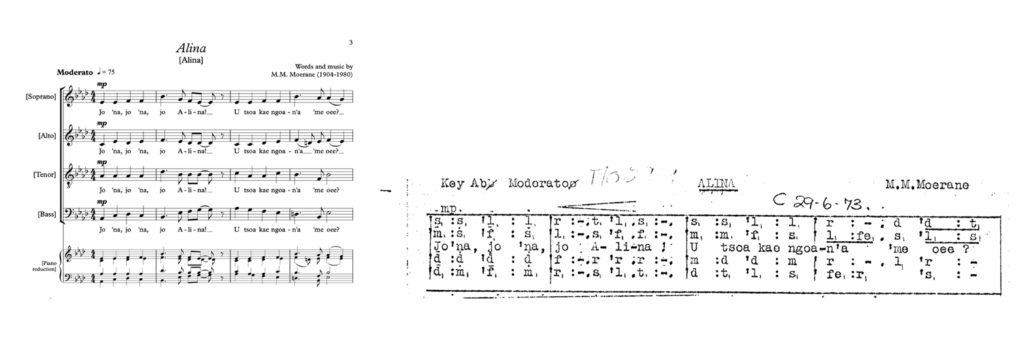This research is being conducted by Ignatia Madalane at Stellenbosch University.
The Moerane Critical Edition Project is a team research project spearheaded by Christine Lucia, that aims to source, collect and publish an online edition of music scores written by (South African) composer Michael Mosoeu Moerane (1904-1980). While Digital Critical Editions are increasingly common in the west they remain a developing area in South Africa, especially in the musical context. The Moerane Critical Edition is only the second of its kind in Southern Africa (probably Africa), preceded by the Joshua Mohapeloa Critical Edition (Lucia 2016). Both are cultural reclamation projects that aim to preserve for both scholarly purposes and performance, entire repertoires of neglected African composers. For both composers, a publishers imprint, African Composers Edition, and a website, https://criticaleditions.co.za , had to be specially constructed in order to present this music and its contexts, and to respect the intellectual property invested in it, in a South African climate of rampant cultural exploitation.
Moerane is a critical figure in black South African notated music (as distinct from jazz, popular and traditional music). He was the first black composer to graduate with a B.Mus from Rhodes University (a College of Unisa) in 1941, with an orchestral ‘Composition Exercise’ Fatše la Heso (Sesotho-‘My Country’) written under the supervision of Frederic Hartmann. Moerane composed over 50 works, 10 of which, written in tonic solfa notation, are common in the South African choral music tradition, while the rest existed until now only in manuscript. The full extent of Moerane’s versatility and proficiency as a composer for choir especially, has remained hidden and Moerane is hardly known even by other South African composers, although songs such as Ruri (Sesotho-‘Truly’), Sylvia, Della, and Matlala are often prescribed for black choral competitions in South Africa’s (still) bifurcated society. The Critical Edition will be available on a dedicated website https://criticaleditions.co.za for easy access, together with contextual documents and critical commentaries.

My participation in this project (2017-2020) is not so much helping to create the edition itself but using Moerane’s oeuvre to interrogate the notion of ‘genre’. His music is difficult to classify because it embodies other musical genres (from South African and elsewhere) which are themselves mixtures of genres, and belongs to a long tradition of composing that comes out of the colonial mission. It is not a ‘world music’, it is hardly recorded at all, most of it is not transcribed, let alone published. I am therefore tasked with exploring this notion of genre and how it is constructed in this context. My findings will therefore be useful for my colleagues working on the music analysis part of Moerane’s Critical Edition Project.
As we embark on the journey of creating and developing the Moerane Digital Critical Edition, we can use the Mohapeloa Critical Edition as a reference point: we will be able to reflect on what worked and what did not, especially in terms of what makes a good digital online edition. If we can produce something better/different with the Moerane edition we can expand this area of digital humanities in South Africa and encourage similar projects. This paper will therefore be a critical analysis of the Mohapeloa Critical Edition (African Composers Edition, 2016) with a view to improving on its shortcomings in the Moerane Critical Edition. This project also offers a unique opportunity to reconsider issues of representation, accessibility, silence/silenced cultural heritage, and identity within the African context.
